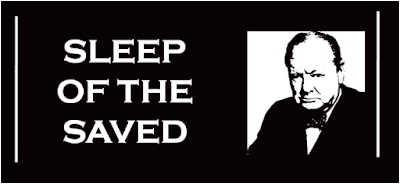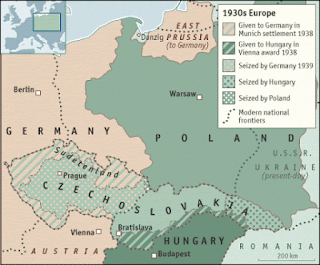 |
PM Neville Chamberlain
arriving at Heston airport
with the non-aggression pact in hand |
In 1938, Prime Minister Chamberlain signed the Munich Pact with Nazi leader Adolf Hitler thereby handing Czechoslovakia to Germany and regarded this “peace in our time”. In September 1939 with Hitler’s invasion of Poland that peace was shattered. Chamberlain declared war against Germany but proved ill-equipped in providing protection to Europe from Nazi invasion. After British forces failed to deter Nazi forces from taking over Norway in April 1940 and Hitler’s invasion of Holland, Belgium & Netherland. Chamberlain lost confidence and Churchill came into power.
On 13th may 1940 Churchill gave a famous speech “Blood, toil, tears, and sweat” and outlined new and bold plans for British resistance against Nazi Germany. In the initial year of the war, Britain was all but alone in his fight against Nazi in Europe but Churchill promised his country and the world that the British people would “never surrender.”
Part of belief in Britain’s survival was based on the conviction that the Soviet Union was the next target on Hitler’s list. Combined with intelligence and his own personal belief Churchill was convinced that Hitler was more interested in Stalin’s destruction than of Britain’s.
Also from the time, Churchill took office as the PM he realized that the only way to conclude the war was to drag the United States into it and making this his center of strategy. Despite the fact, Chamberlain didn’t establish any dialogue with the United States Churchill as soon as taking power developed a regular and intense correspondence with FDR. In his initial letter to Roosevelt showed a sense of urgency for securing assistance from the United States by warning of the consequences for the American security in case of the British defeat.Following is the extract from Churchill’s letter to Roosevelt on May 15, 1940“But I trust you realize, Mr.President, that the voice and force of the United States may count for nothing if they are withheld too long. You may have a completely subjugated, Nazified Europe established with astonishing swiftness, and the weight may be more than we can bear. All I ask now is that you should proclaim nonbelligerency, which would mean that you would help us with everything short of actually engaging armed forces”
After the American formal announcement to enter the war after the Japanese attack on Pearl Harbor on December 7,1941. Churchill aide John Colville stated that the prime minister and American Ambassador John Gilbert Winant, who also supported the British, "sort of danced around the room together" as the United States would now enter the war, making a British victory likely. Churchill later wrote, "Being saturated and satiated with emotion and sensation, I went to bed and slept the sleep of the saved and thankful".
Within the days of Pearl Harbor attack, Churchill along with his military chiefs traveled to America in order to work with the American counterpart to develop a combined strategy for Europe as Hitler was posing as a grave threat to the world. |
Churchill adressing the Joint Session of
United States Congress |
On December 26, 1941, Churchill for the first time gave a speech in the United States Congress and urged that Americans to join Britain in the war. Regarding the Japanese aggressors, he asked, "What kind of a people do they think we are? Is it possible that they do not realize that we shall never cease to persevere against them until they have been taught a lesson which they and the world will never forget?"
As for the German forces, "With proper weapons and proper organization, we can beat the life out of the savage Nazi." These "wicked men" who have brought evil forces into play must "know they will be called to terrible account if they cannot beat down by force of arms the peoples they have assailed."
It may come across as a simple sound bite, but the point of it was to link the United States and Britain into a single, allied front.







.jpg)

